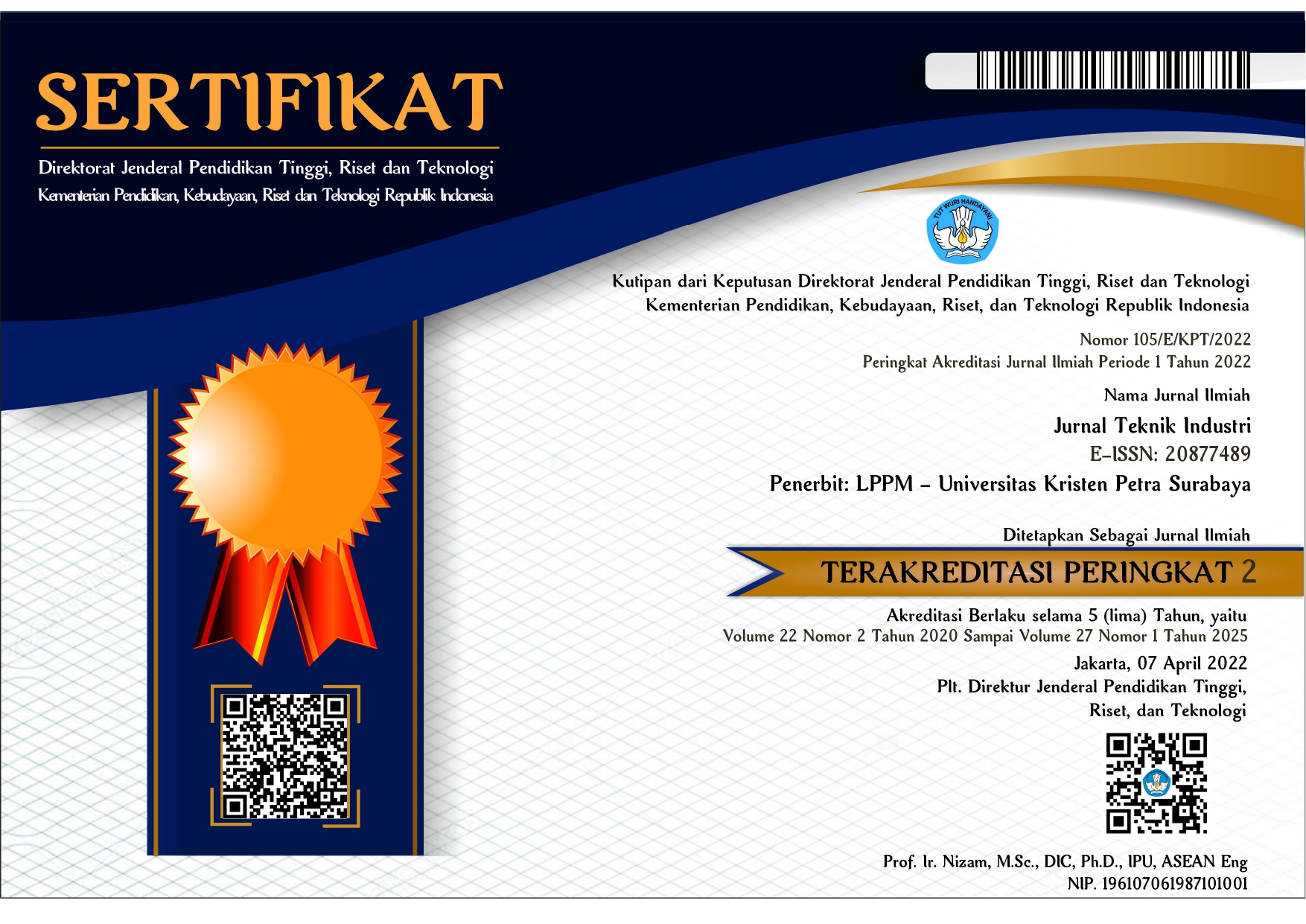Model Optimisasi untuk Penjadwalan Ulang Perjalanan Kereta Api
DOI:
https://doi.org/10.9744/jti.17.2.97-104Abstract
This paper discusses the train rescheduling problem due to disturbances. The train rescheduling problem discussed in this paper is taken from a real train network of DAOP II Bandung in Jawa, Indonesia. The train network consists of block sections including unidirectional double-tracks and bidirectional single-tracks. There are some connections among trains because they use same rolling stocks. A mixed integer linear programming model is formulated to represent the problem. Main decision variables of the model are new departure and arrival times due to the disturbance. The objective function to be minimized is the total weighted delay. The model is examined using a hypothetical instance for four disturbance cases. Numerical experiments show that the model can represent the problem under studyDownloads
References
Cacchiani, V., Huisman, D., Kidd, M., Kroon, L., Toth, P., Veelenturf, L., and Wagenaar, J., An Overview of a Recovery Models and Algorithms for a Real-Time Railway Scheduling, Transportation Research Part B, 63, 2014, pp. 15-37.
Törnquist, J., and Persson, J.A., Train Traffic Deviation Handling using Tabu Search and Simulated Annealing, Proceeding of The 38th Hawaii International Conference on System Science (HICSS’38), IEEE, Hawaii, 2005.
Törnquist, J., and Persson, J.A., N-Tracked Railway Traffic Re-Scheduling During Disturbance: Theoretical and Practical Implications, Transpor-tation Research Part B, 41 (3), 2007, pp. 342-362.
Corman, F., D’Ariano, A. Pacciarelli, D., and Pranzo, M., Centralized Versus Distributed Systems to Reschedule Trains in Two Dispatching Areas, Public Transport, 2 (3), 2010, pp. 219-247.
Albrecht, A.R., Panton, D.M., and Lee, D.H., Rescheduling Rail Networks with Maintenance Disruption using Problem Space Search, Computers and Operations Research, 40, 2013, pp. 703-712.
Narayanaswami, S., and Rangaraj, N., Modelling Disruptions and Resolving Conflicts Optimally in a Railway Schedule, Computers and Industrial Engineering, 64, 2013, pp. 469–481
Dündar, S., and Şahin, I., Train Re-Scheduling with Genetic Algorithms and Artificial Neural Networks for Single-Track Railways, Transportation Research Part C, 27, 2013, pp. 1-15.
Sato, K., Tamura, K., and Tomii, N., A MIP-Based Timetable Rescheduling Formulation and Algorithm Minimizing Further Incovenience to Passengers, Journal of Rail Transport Planning and Management, 3, 2013, 38-53.
Meng, X., and Jia, L., Train Rescheduling on Single-Track Railway Model Based on Fuzzy Comprehensive Optimization, Journal of Infor-mation and Computational Science, 11 (5), 2014, 1597-1603.
Meng, L., and Zhou, X., Simultaneous Train Rerout-ing and Rescheduling on an N-Track Network: A Model Reformulation with Network-Based Cumulative Flow Variables, Transportation Research Part B, 67, 2014, pp. 208-234.
Pellegrini, P., Marlière, G., and Rodriguez, J., Optimal Train Routing and Scheduling for Managing Traffic Pertubations in Complex Junctions, Transportation Research Part B, 59, 2014, pp. 58–80.
Zhan, S., Kroon, L.G., Veelenturf, L.P., and Wagenaar, J.C., Real-Time High-Speed Train Scheduling in Case of a Complete Blockage, Transportation Research Part B, 78, 2015, pp. 182–201.
Downloads
Published
How to Cite
Issue
Section
License
Articles published in the Jurnal Teknik Industri: Jurnal Keilmuan dan Aplikasi Teknik Industri will be Open-Access articles distributed under the terms and conditions of the Creative Commons Attribution License (CC BY).
![]()
This work is licensed under a Creative Commons Attribution License (CC BY).


















